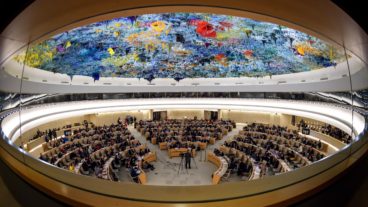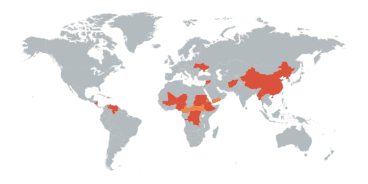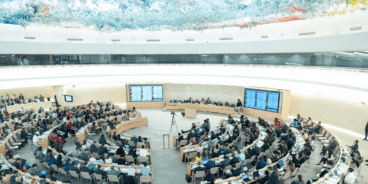
Atrocity Alert No. 127: Yemen, Central African Republic, Human Rights Council Elections
Atrocity Alert is a weekly publication by the Global Centre for the Responsibility to Protect highlighting situations where populations are at risk of, or are enduring, mass atrocity crimes.
12 million Yemenis face starvation as airstrikes and war crimes continue
On Monday, 15 October, the UN humanitarian coordinator for Yemen, Lise Grande, said that at least 12 million Yemeni civilians are now at risk of starvation and that if the war continues, famine could engulf the entire country. Ms. Grande said that within the next three months Yemen could potentially face “the worst famine in the world in 100 years.”
This announcement followed reports that on 13 October at least 15 civilians were killed in airstrikes by the Saudi Arabia/United Arab Emirates-led coalition in Yemen. The airstrikes targeted minibuses carrying civilians in the Jabal Ras District of Hodeidah Governorate.
Hodeidah port is the entry point for approximately 80 percent of the food and fuel imports upon which over 22 million Yemenis currently depend for survival. Yemeni government forces, supported by the Saudi/UAE-led coalition, resumed a military offensive on the city of Hodeidah on 12 June. Since then more than 425,000 people have been forced to flee their homes in the governorate.
On 5 October Houthi forces shelled an internally displaced persons camp in Hodeidah Governorate, killing one civilian and wounding twelve. The Houthis have also systematically persecuted members of the minority Bahá’í faith. On 10 October five UN independent experts condemned recent charges of apostasy and espionage brought against 24 individuals, at least 22 of whom are members of the Bahá’í community. The experts called upon the Houthi de-facto authorities in Sana’a to “put an immediate stop to the persistent persecution of Bahá’ís in Yemen and to release those arrested due to their religion or belief.”
Yemen is now the largest humanitarian crisis in the world. Ongoing attacks on civilians and civilian infrastructure, the deliberate obstruction of humanitarian aid, and the systematic targeting of religious minorities may amount to war crimes and crimes against humanity.
Despite the risk of catastrophic famine facing the country, the UN Security Council has not passed a substantive resolution on Yemen since March 2015. In an effort to protect civilians and secure the main conduit for emergency humanitarian aid to Yemen, the Council should demand an immediate ceasefire in Hodeidah and impose targeted sanctions on all those responsible for atrocities.
Recent massacre highlights ongoing insecurity in CAR
Last week Human Rights Watch (HRW) reported that on 6 September a massacre of at least nine civilians was committed around the town of Bria, in the Haute-Kotto prefecture of the Central African Republic (CAR). According to HRW, the civilians were killed outside an internally displaced persons camp by armed men belonging to the Front Populaire pour la Renaissance de la Centrafrique(FPRC), an ex-Séléka armed group that controls parts of Bria. Some of the victims appeared to have been tortured before being killed.
Bria has become an epicenter of violence between rival armed groups, most of which are loosely affiliated to either ex-Séléka rebels or anti-Balaka militias. Predatory armed groups continue to control an estimated 70 percent of CAR’s vast territory and despite the presence of a UN peacekeeping mission (MINUSCA), the country remains one of the most dangerous in the world for civilians, humanitarian workers and peacekeepers.
With the support of CAR’s government, MINUSCA must continue to improve its ability to rapidly respond to emerging threats, neutralize armed groups and uphold its civilian protection mandate. The CAR government, utilizing the Special Criminal Court, should investigate and prosecute all perpetrators of war crimes and crimes against humanity, including those responsible for the Bria massacre.
UN General Assembly elects alleged atrocity perpetrators to Human Rights Council
On Friday, 12 October, members of the UN General Assembly voted in a secret ballot to elect 18 countries to the Geneva-based Human Rights Council (HRC) for the 2019-2021 term. Once again, this year’s elections consisted entirely of “clean slates,” in which the five regional groups only proposed as many candidates as there were seats available. This resulted in the uncontested election of a number of governments who are responsible for large-scale human rights violations, including potential mass atrocity crimes.
In Cameroon – elected to the HRC for the third time since its establishment in 2006 – government security forces are violently repressing an armed rebellion in the country’s Anglophone regions. The army has been accused of arbitrary arrests, sexual violence, widespread extrajudicial killings, and the burning of numerous Anglophone villages.
According to the HRC’s own Commission of Inquiry, the government of Eritrea – elected to the Council for the first time – has perpetrated crimes against humanity, including enforced disappearances, torture, persecution and murder. The government of Eritrea has previously refused to cooperate with the Commission, and will now sit on the Council responsible for overseeing its mandate.
Since President Rodrigo Duterte was elected President of the Philippines in 2016, over 12,000 people have been killed during his self-declared “war on drugs,” and the International Criminal Court has opened a preliminary examination into possible crimes against humanity. In response to their election to the HRC, President Duterte’s spokesperson said that the government’s much-criticized “campaign against illegal drugs, corruption, and criminality has, in effect, been acknowledged by the international community as essential to the protection of the right to life, liberty and property.”
UN General Assembly Resolution 60/251 stipulates that criteria for HRC membership include a candidate’s “contribution to the promotion and protection of human rights,” as well as voluntary pledges for strengthening a country’s commitment to human rights. Uncontested “clean slate” elections eliminate the need for candidates to demonstrate this commitment and undermine the HRC’s credibility.
UN member states should actively pursue practical reforms of the HRC, including the elimination of uncontested elections. If “clean slate” elections continue, member states should not vote for any candidate that has been accused of large-scale human rights violations – including potential mass atrocity crimes. The UNGA should also make use of its right to suspend a country from membership of the HRC if it persistently commits gross and systematic human rights violations.
Read Next

Related Publications

Atrocity Alert No. 403: Israel and the Occupied Palestinian Territory, Sudan and the UN Human Rights Council

